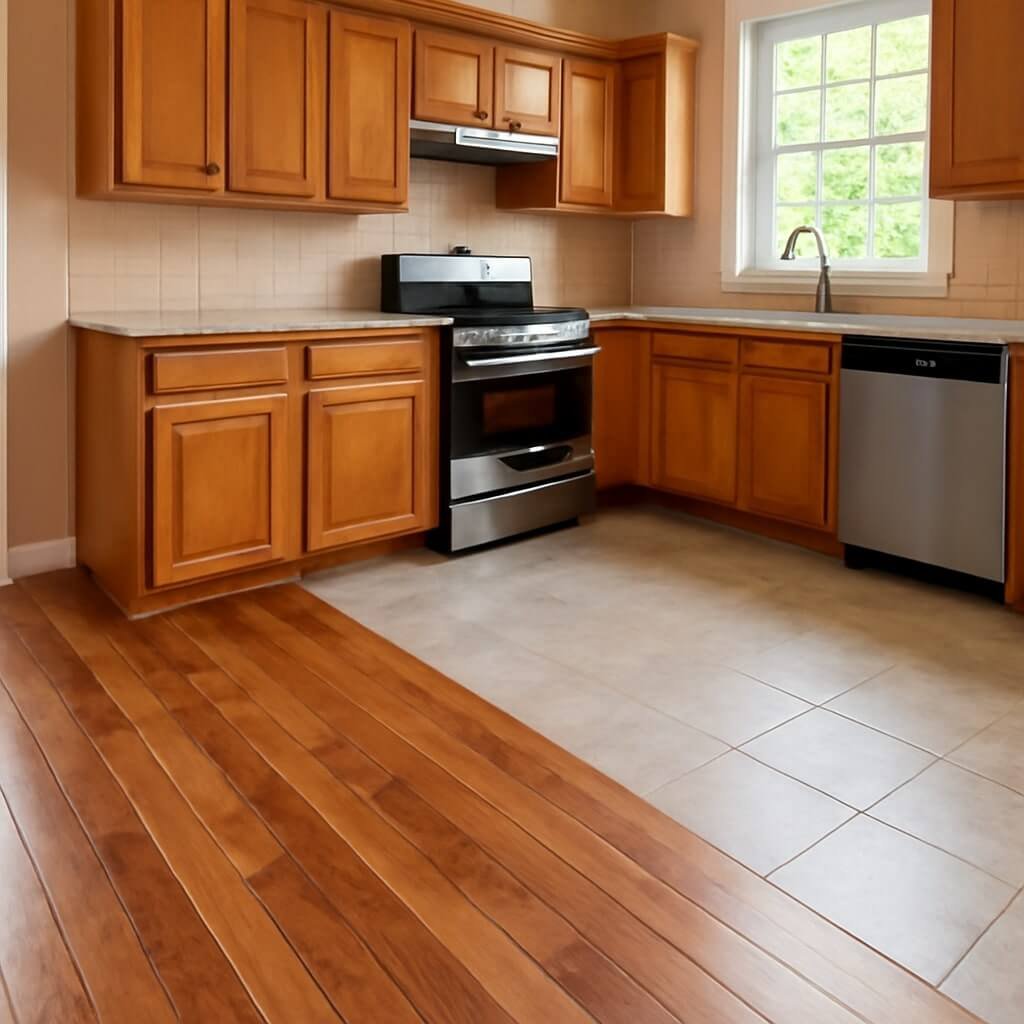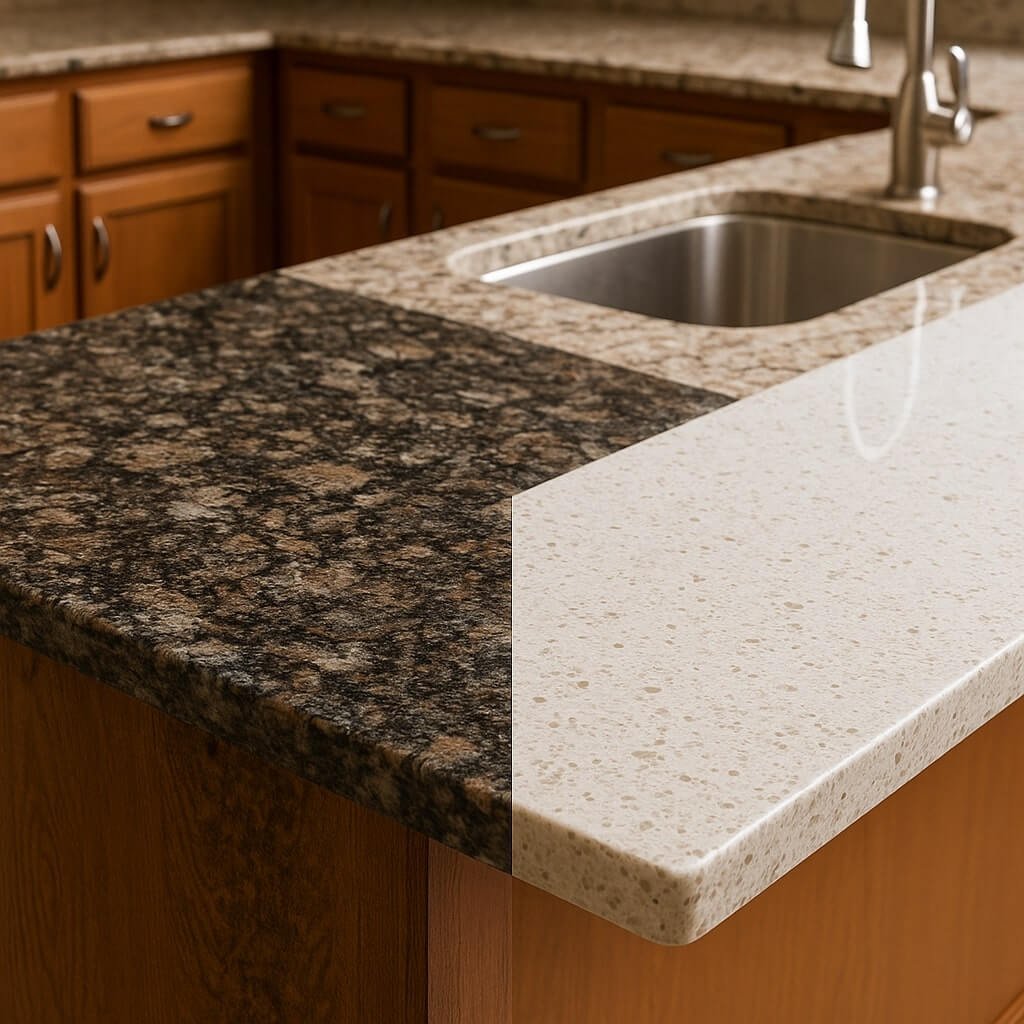When it comes to choosing the best flooring for your kitchen, the debate between hardwood and tile has been ongoing for years. Both materials offer distinct advantages and challenges. This guide compares hardwood vs tile kitchen flooring in terms of durability, aesthetics, maintenance, cost, and overall performance to help you make an informed decision for your kitchen.
1. Durability: Hardwood vs Tile
Hardwood flooring is known for its timeless beauty and warm feel, but it requires regular care to maintain its durability. It is prone to scratching, denting, and water damage, especially in high-traffic areas like kitchens. Over time, hardwood may show signs of wear and tear, although it can be sanded and refinished to restore its appearance.
On the other hand, tile flooring is incredibly durable and resistant to moisture, making it ideal for kitchens where spills are common. It is scratch-resistant and can withstand heavy foot traffic. While tiles are known for their durability, they can crack or chip if something heavy is dropped on them. However, repairing a single tile is easier than replacing a whole section of hardwood.
2. Aesthetic Appeal: Hardwood vs Tile
Hardwood floors exude a classic and sophisticated look that adds warmth and elegance to a kitchen. They complement nearly any interior design style, from traditional to modern. With various stains and finishes available, hardwood can be tailored to match your vision.
Tile flooring, meanwhile, offers greater variety in terms of design. Tiles come in an array of colors, shapes, and patterns, including natural stone, ceramic, and porcelain. If you’re looking for a more contemporary or artistic design, tile may provide more versatility. Additionally, tiles can mimic the look of hardwood or other materials while offering superior performance in kitchens.
3. Maintenance: Hardwood vs Tile
When it comes to cleaning and upkeep, hardwood floors require regular sweeping and occasional mopping with a damp cloth. It’s crucial to avoid excess water, as prolonged exposure can damage the wood. Additionally, hardwood may need refinishing every few years, depending on traffic and wear.
Tile floors are generally easier to maintain. They are resistant to stains, water, and odors, making them easy to clean. Regular sweeping and mopping are typically sufficient to keep them looking fresh. However, the grout lines between tiles may require more frequent cleaning to avoid discoloration and buildup of dirt.
4. Cost Comparison: Hardwood vs Tile
The cost of both hardwood and tile flooring can vary greatly based on quality, style, and brand. Hardwood floors tend to be more expensive than tile in terms of both materials and installation. The labor-intensive process of installation can contribute to higher costs, especially for custom wood finishes.
ile flooring, while initially cheaper than hardwood, can become more expensive depending on the type of tile selected. High-end materials like marble or premium porcelain can push the price up significantly. However, tile is usually easier to install for DIY enthusiasts, which can reduce installation costs.
5. Water Resistance: Hardwood vs Tile
Kitchens are notorious for high moisture levels, making water resistance a crucial factor. Tile flooring has a clear advantage here. Its non-porous surface makes it highly resistant to water, making it an ideal choice for kitchens where spills are common.
While hardwood floors are beautiful and functional, they don’t hold up as well against water. Prolonged exposure to moisture can cause warping, swelling, and stains. However, modern hardwoods with water-resistant finishes or engineered hardwood options are better suited for kitchens.
6. Comfort Underfoot: Hardwood vs Tile
Hardwood flooring provides a warmer and more comfortable surface underfoot compared to tile. It naturally absorbs warmth and feels less cold during winter months, making it more comfortable for long hours of standing or walking.
Tile floors, especially ceramic or porcelain, can feel cold underfoot, particularly in cooler climates. While radiant floor heating can mitigate this issue, it adds to the installation cost. However, tile can be more comfortable in warmer climates, offering a cool sensation underfoot.
FAQ: Hardwood vs Tile – Which Is Better for Kitchen Floors?
1. Which flooring option is more affordable: hardwood or tile?
Tile flooring is generally more affordable than hardwood, especially when considering lower-end options. However, the cost can vary based on the quality and type of tile or hardwood selected.
2. Is tile flooring better for kitchens?
Tile flooring is often the better choice for kitchens due to its moisture resistance, durability, and ease of cleaning. However, if you’re looking for warmth and a classic look, hardwood may be more appealing.
3. Can hardwood floors be used in kitchens?
Yes, hardwood floors can be used in kitchens but require extra care to protect against moisture and wear. Opting for engineered hardwood or finishes designed for high-moisture environments can increase durability.
4. Are tile floors more durable than hardwood?
Yes, tile floors are generally more durable than hardwood. They resist moisture, stains, and scratches better than hardwood and are easier to maintain.
5. How easy is it to repair hardwood or tile floors?
Hardwood floors can be sanded and refinished if damaged, but this can be time-consuming and costly. Tile floors are easier to repair; you can replace individual tiles if they crack or chip.
Conclusion: Hardwood vs Tile for Kitchen Floors
Choosing between hardwood and tile flooring for your kitchen depends on your priorities. If you value timeless beauty and warmth and are prepared to invest in upkeep, hardwood could be the right choice. However, if durability, moisture resistance, and easy maintenance are more important, tile flooring will likely serve you better in the long run.




